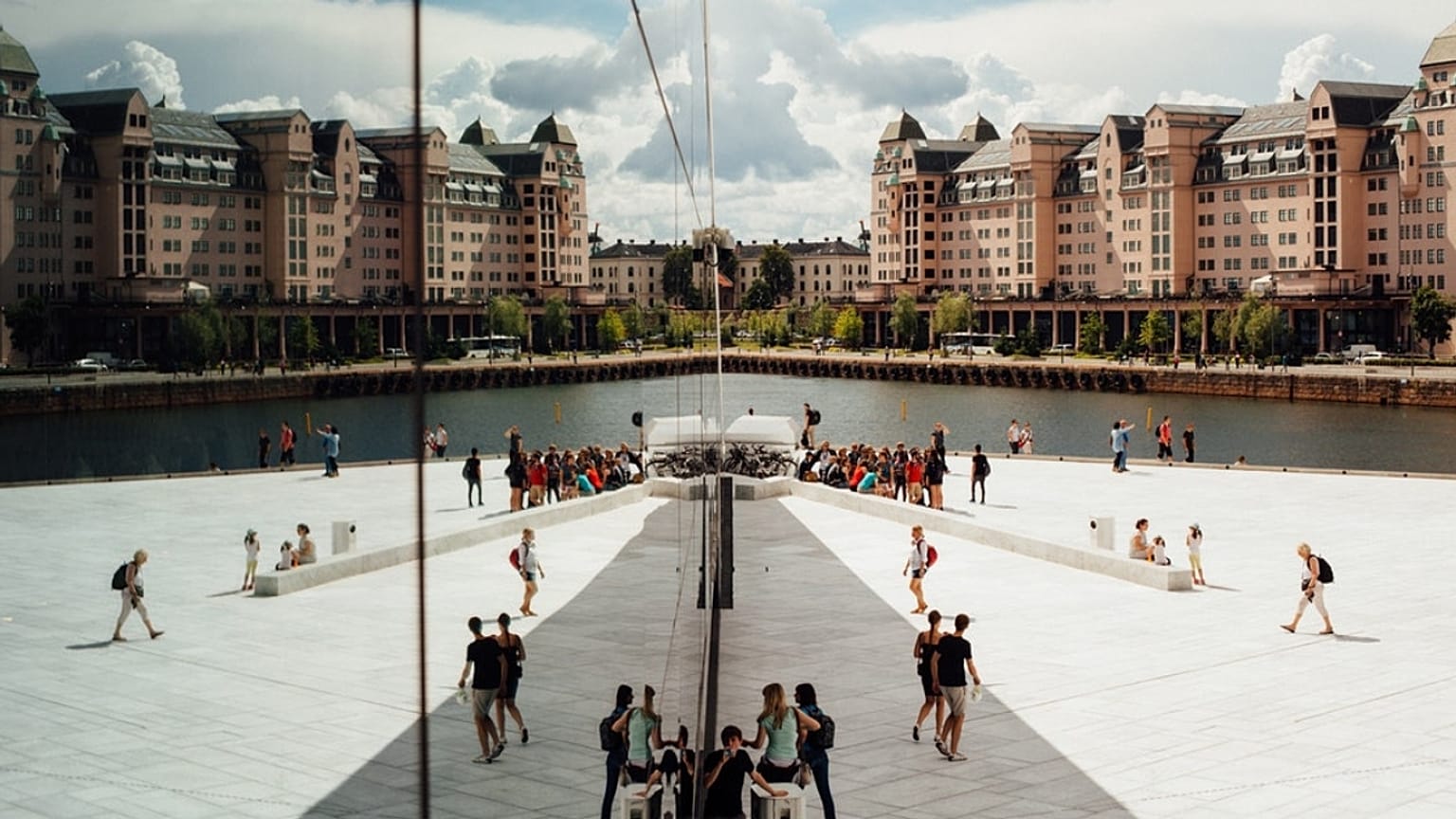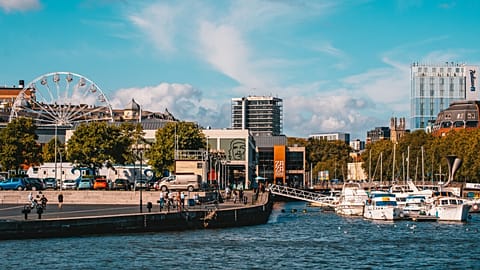The Norwegian capital is the European Green Capital for 2019.
There are many reasons why Oslo makes for the perfect green destination. The Norwegian capital is the European Green Capital for 2019 and Norway ranks number one in the Planet & Climate category of the Good Countries Index. The country has taken steps to becoming climate neutral by 2030 and sales of electric cars now outnumber petrol and diesel vehicles.
Public buses run off fossil fuel alternatives like biodiesel from food waste. City dwellers are exploring alternative food systems by planting hydroponic gardens, creating urban farming projects and installing bee hives on rooftops. And businesses are going green as cafes, restaurants and hotels embrace sustainability in an effort to do their part for the environment.
Keen to explore the European Green Capital?
Here's our Green Weekend guide to Oslo.
In a drive to reduce carbon dioxide emissions and improve air quality, a 1.9-square-km area of Oslo's city centre has been transformed into a car-free zone. 700 parking spots have given way to bicycle lanes painted in bright red, criss-crossing the city. Streets have been pedestrianised and urban spaces reclaimed by plants and flowers, street benches, mini-parks and pavement cafes.
Related | Touring Oslo’s creative scene
Of course the best way to explore these new developments in the compact city centre is on foot or by bicycle. If your prefer two wheels, Oslo Bysykkel is the bike-sharing system with 250 stations dotted in and around the city centre.
The efficient public transportation system is an option if you need to head out from the centre of town. Tickets can be used on the metro, tram, bus and ferry routes as well as urban trains. The handy Oslo Pass is designed for visitors and valid for 24, 48 or 72 hours, and doubles as a free pass to most museums (yes, including the Munch Museum where you can see the Norwegian artist's iconic The Scream).
Best green accommodation in Oslo
There's no shortage of green accommodation in Oslo. Eco-friendly hotels are recognised thanks to an environmental certification called Eco-Lighthouse. Hotels granted this label must follow a list of stringent guidelines that cover sustainable measures covering energy and water use, and waste disposal and treatment, but also conditions like using eco-friendly suppliers and supporting a healthy work environment. Big chains like Scandic, Thon and Radisson Blu have implemented these in many of their hotels.
The historic Hotel Continental
has been around since 1900 but has adopted green credentials in line with modern times. The management has committed to reducing food waste in the two on-site restaurants by 20 per cent, put a recycling programme in place, introduced digital platforms to replace traditional paper, and is working to reduce paper and plastic with suppliers. Other good reasons for a stay: guest rooms here been tastefully refurbished, the hotel is home to the popular Theatercafeen – a Viennese-style cafe, and its location bang opposite the National Theatre.
Related | Ghent: Europe’s need-to-know green city
What to see in Oslo?
Oslo's newly developed nine-km-long harbour promenade is a good introduction to the city. Running along the city's waterfront and linking the city from east to west, this pedestrianised walkway is marked by information towers painted in bright orange with details on things to see and do in the area. Along this waterfront route you'll pass landmarks like Aker Brygge Wharf and its trendy shops and restaurants, the modernist glass front and sharp angles of the building housing the Norwegian National Opera & Ballet, the Barcode District – a new development of high-rise buildings, and the redesigned wooden Sørenga pedestrian bridge.
Bjørvika is a former container port that's been transformed into Losæter, an urban farming initiative. Here allotment gardens are tended by locals who grow organic produce, a 'bakehouse' invites bakers to use the communal oven, while growing in neat rows in the 'grainfield' are nine types of ancient grains. This is also an alfresco summertime venue for art projects and weekly communal dinners.
Sustainable drinking and dining in Oslo
The vibe at Torggata Botaniske is of a tropical rainforest. This compact bar is filled with hanging plants and dangling vines, and tucked in the back room is a hydroponic garden where herbs are specially grown for the cocktails served up here. The cocktail concoctions available change almost daily and are infused with botanical ingredients like the basil and coriander grown on-site or more exotic additions, like rooibos or cardamom.
Related | What makes Amsterdam’s first sustainable hotel so special?
The culinary ethos at **Restaurant Rest **makes a strong case for the fight against food waste and a “rejection of modern consumerism”. It takes ingredients that would otherwise be rejected by restaurants and supermarkets like misshaped veggies and imperfect produce and transforms them into a fine dining experience. Ingredients change daily according to what's available, so no menu here, and don't expect exclusively Nordic cuisine: the kitchen team loves to play with Asian, South American, Italian and Spanish flavours.
The business concept at vegan restaurant **Nordvegan **is described as “not just a food business but a global calling to the people of the world to make positive and constructive changes to eating habits, daily activities and more sustainable living.” Chef Reuben Waller who's worked the kitchens of several Michelin-starred restaurants, turns out tasty dishes with a low environmental footprint thanks to the plant-based ingredients. The changing menu could include sandwiches, sushi or salads but also lasagna, enchiladas and curries. When it comes to vegan desserts, the crème brûlée and raw cheesecake are firm favourites here.
Shopping: Eco-conscious Nordic fashion
Oslo's eco-conscious fashionistas head to the city's many second hand boutiques peddling vintage wear. One that stands out is Ma Vintage. Here, lovers of recyclable fashion, bags, jewellery and footwear will find designer brands like Chanel, Dior, Prada, Burberry, Marc Jacobs, Dolce & Gabbana and Yves Saint Laurent.
Related | Our selection of the best vintage shops in Paris
Another sustainable approach to fashion is to forgo buying new clothes and simply rent them instead. “Redefining the way we consume fashion” is the concept at Fjong, where business, wedding, formal or just everyday wear can be booked online or in their showroom. There's plenty to choose from with 4000 pieces of new and vintage clothing, including high-end designer labels. They also deliver anywhere in Norway and a personal stylist is on hand for wardrobe advice.
Words: Isabel Putinja


















